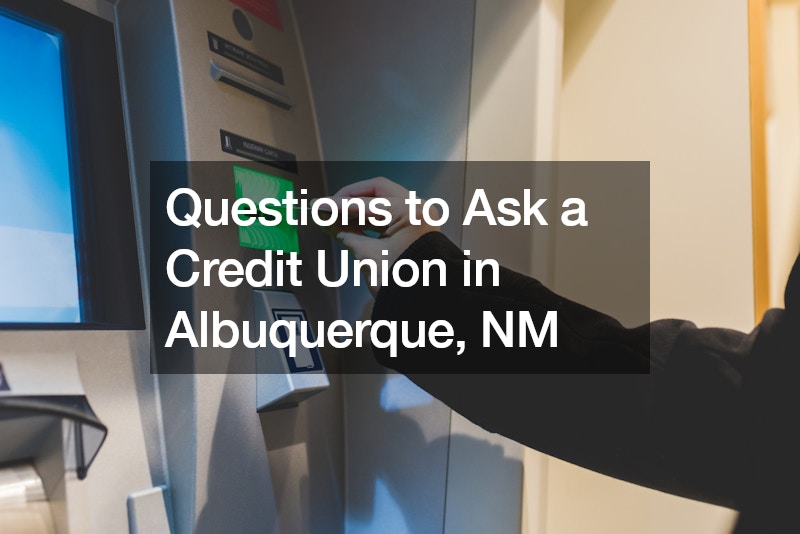
Choosing a credit union in Albuquerque, NM, can be a wise financial decision for many individuals and families. Credit unions often offer competitive rates, personalized service, and a strong sense of community. However, before you commit to joining a credit union, it’s essential to ask the right questions to ensure it meets your needs and expectations.
Here are some important questions to consider:
1. What Are the Membership Requirements?
Credit unions typically have specific membership criteria based on factors such as geographic location, employer, or membership in certain organizations. Ask about the eligibility requirements to join the credit union in Albuquerque, NM. Understanding these criteria will help you determine if you qualify for membership and if the credit union is a good fit for you.
2. What Types of Accounts and Services Are Offered?
Credit unions offer a variety of financial products, including checking and savings accounts, loans, credit cards, and investment services. Inquire about the types of accounts available and the features of each. For example, ask about interest rates on savings accounts, the availability of free checking accounts, and any fees associated with account maintenance. Additionally, find out if they offer online and mobile banking services, which can provide convenience and flexibility.
3. What Are the Fees and Charges?
One of the advantages of credit unions is their typically lower fees compared to traditional banks. However, it’s important to understand all potential fees associated with your accounts and services. Ask for a detailed fee schedule that includes charges for ATM usage, overdrafts, account maintenance, and wire transfers. Knowing these fees upfront can help you avoid surprises and manage your finances more effectively.
4. What Are the Interest Rates on Loans and Credit Cards?
Credit unions often offer lower interest rates on loans and credit cards than traditional banks. Ask about the current interest rates for various types of loans, including auto loans, personal loans, mortgages, and credit cards. Compare these rates with those offered by other financial institutions to ensure you are getting the best deal. Additionally, inquire about the terms and conditions of the loans, such as repayment periods and any associated fees.
5. How Is Your Location Governed?
Credit unions are member-owned and operated, which means that their governance structure can impact your experience as a member. Ask about how the credit union is governed, including how the board of directors is selected and how members can participate in decision-making processes. Understanding the governance structure can give you insight into the credit union’s priorities and how it operates.
6. What Financial Education Resources Are Available?
Many credit unions offer financial education resources to help members improve their financial literacy and make informed decisions. Ask about the availability of workshops, seminars, online courses, and one-on-one financial counseling. These resources can be valuable tools in helping you achieve your financial goals and manage your money more effectively.
7. How Are Member Concerns and Complaints Handled?
It’s important to know how the credit union addresses member concerns and complaints. Ask about the process for resolving issues, including how to contact customer service and the expected response time. Understanding how the credit union handles complaints can give you confidence in their commitment to member satisfaction.
8. What Are the Benefits of Membership?
Credit unions often provide additional benefits to their members, such as discounts on insurance, access to special events, and participation in loyalty programs. Ask about the specific benefits available to members of the credit union in Albuquerque, NM. These perks can enhance your overall banking experience and provide added value.
9. Are You Insured?
Federal insurance protects your deposits in case the credit union fails. Most credit unions are insured by the National Credit Union Administration (NCUA), which provides similar coverage to the FDIC insurance offered by banks. Confirm that the credit union is insured and understands the limits of the coverage, which typically insures deposits up to $250,000 per account holder.
10. Are There Branches and ATMs Conveniently Located?
Accessibility is an important factor when choosing a credit union. Ask about the locations of branches and ATMs in Albuquerque and whether there are any partnerships with other credit unions that provide additional access. Knowing the availability of branches and ATMs can help you determine if the credit union is convenient for your banking needs.
11. How Are Loan and Credit Applications Evaluated?
Understanding the credit union’s lending criteria is crucial if you plan to apply for loans or credit cards. Ask about the factors that are considered in the application process, such as credit score, income, and employment history. Additionally, inquire about the typical approval time and any steps you can take to improve your chances of approval.
12. What Community Involvement Programs Do You Support?
Many credit unions are actively involved in their local communities, supporting various charitable initiatives and events. Ask about the credit union’s community involvement programs and how they contribute to the Albuquerque area. This can provide insight into the credit union’s values and commitment to making a positive impact.
In conclusion, asking these questions can help you gather the information needed to make an informed decision when choosing a credit union in Albuquerque, NM. By understanding the membership requirements, services offered, fees, and governance structure, you can find a credit union that aligns with your financial goals and values. Whether you’re looking for competitive loan rates, excellent customer service, or community involvement, a credit union can be a great choice for managing your finances.
.





